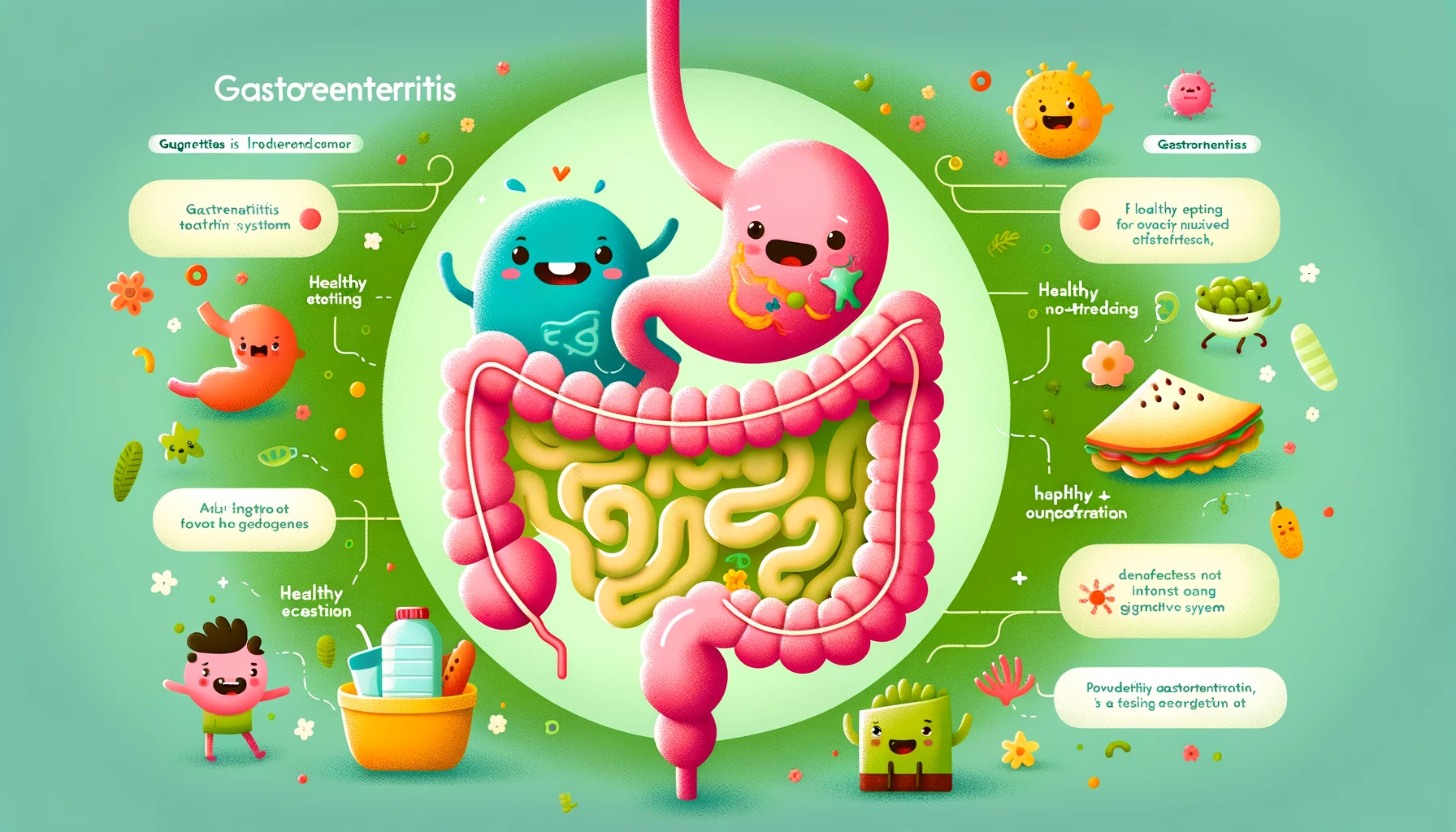Understanding Gastroenteritis: Causes, Symptoms, and Treatments
Understanding Gastroenteritis: Causes, Symptoms, and Treatments
Table of Contents
- Introduction to Gastroenteritis
- Causes of Gastroenteritis
- Symptoms of Gastroenteritis
- Risk Factors for Gastroenteritis
- Diagnosis of Gastroenteritis
- Treatment of Gastroenteritis
- Prevention Strategies
- When to Seek Medical Attention
- Conclusion
- References
Understanding Gastroenteritis: Causes, Symptoms, and Treatments
Introduction to Gastroenteritis Gastroenteritis, often referred to as the stomach flu, is an inflammation of the stomach and intestines. It can cause a range of symptoms, including diarrhea, vomiting, and abdominal pain. This article explores the causes, symptoms, and treatments of gastroenteritis, helping you understand how to manage and prevent this common condition.
Causes of Gastroenteritis Gastroenteritis can be caused by various infectious agents, including viruses, bacteria, and parasites, as well as non-infectious factors.
Viral Infections
Viruses are the most common cause of gastroenteritis. Common viral culprits include:
- Norovirus: The leading cause of gastroenteritis outbreaks, especially in crowded environments such as cruise ships, schools, and nursing homes.
- Rotavirus: A common cause of gastroenteritis in infants and young children, though vaccination has reduced its prevalence.
- Adenovirus: Can cause gastroenteritis, particularly in young children.
- Astrovirus: Usually affects young children, the elderly, and immunocompromised individuals.
Bacterial Infections
Bacterial gastroenteritis is often associated with food poisoning. Common bacteria include:
- Salmonella: Often found in raw or undercooked poultry, eggs, and contaminated produce.
- Escherichia coli (E. coli): Certain strains can cause severe gastrointestinal symptoms, often linked to contaminated food or water.
- Campylobacter: Typically found in raw or undercooked poultry and unpasteurized milk.
- Shigella: Spreads through contaminated food or water and person-to-person contact.
- Vibrio cholerae: Causes cholera, a severe form of gastroenteritis often associated with contaminated water.
Parasitic Infections
Parasites that can cause gastroenteritis include:
- Giardia lamblia: Spread through contaminated water and food.
- Cryptosporidium: Can be found in contaminated water and food, and is resistant to chlorine disinfection.
- Entamoeba histolytica: Causes amoebiasis, typically in areas with poor sanitation.
Non-Infectious Causes
Non-infectious causes of gastroenteritis include:
- Food Allergies: Reactions to certain foods can cause gastrointestinal symptoms.
- Medications: Certain medications, such as antibiotics, can disrupt the normal balance of bacteria in the gut.
- Toxins: Chemical toxins from food, water, or the environment can cause gastroenteritis.
Symptoms of Gastroenteritis The symptoms of gastroenteritis can vary depending on the cause but often include:
- Diarrhea: Loose, watery stools that may occur frequently.
- Vomiting: Frequent episodes of vomiting.
- Abdominal Pain: Cramping or discomfort in the stomach area.
- Nausea: A feeling of sickness with an urge to vomit.
- Fever: Elevated body temperature, which may accompany an infection.
- Dehydration: Symptoms include dry mouth, excessive thirst, reduced urine output, and dizziness.
Risk Factors for Gastroenteritis Certain factors can increase the risk of developing gastroenteritis:
- Age: Infants, young children, and the elderly are more susceptible.
- Weakened Immune System: Individuals with compromised immune systems are at higher risk.
- Living Conditions: Crowded living environments, such as dormitories, nursing homes, and cruise ships, can facilitate the spread of infections.
- Travel: Traveling to areas with poor sanitation increases the risk of exposure to infectious agents.
Diagnosis of Gastroenteritis Diagnosing gastroenteritis typically involves a medical history review and physical examination. In some cases, additional tests may be required:
- Stool Sample Analysis: To identify the presence of bacteria, viruses, or parasites.
- Blood Tests: To check for signs of dehydration and infection.
- Rapid Diagnostic Tests: Specific tests for certain pathogens, such as rotavirus or norovirus.
Treatment of Gastroenteritis Treatment for gastroenteritis focuses on relieving symptoms and preventing dehydration:
Hydration
- Oral Rehydration Solutions (ORS): Specially formulated solutions that contain electrolytes to help rehydrate the body.
- Intravenous Fluids: For severe dehydration, intravenous fluids may be necessary in a medical setting.
Medications
- Antidiarrheal Medications: Medications like loperamide can help reduce diarrhea, but are not always recommended, especially in bacterial infections.
- Antiemetics: Medications to reduce nausea and vomiting.
- Antibiotics: Used in specific cases of bacterial gastroenteritis but are not effective against viral infections.
Home Care
- Rest: Allow the body to recover by getting plenty of rest.
- Diet: Gradually reintroduce bland foods such as bananas, rice, applesauce, and toast (BRAT diet) as symptoms improve.
Prevention Strategies Preventing gastroenteritis involves good hygiene practices and safe food handling:
- Hand Washing: Wash hands thoroughly with soap and water, especially before eating and after using the bathroom.
- Safe Food Practices: Cook food thoroughly, avoid cross-contamination, and refrigerate leftovers promptly.
- Clean Water: Drink bottled or treated water, especially when traveling in areas with questionable water quality.
- Vaccination: Vaccines are available for rotavirus, which can prevent severe gastroenteritis in infants and young children.
When to Seek Medical Attention Seek medical attention if you experience severe symptoms such as:
- Persistent Vomiting: Inability to keep liquids down for more than 24 hours.
- Severe Dehydration: Symptoms include extreme thirst, dry mouth, sunken eyes, and little or no urination.
- Blood in Stools or Vomit: Presence of blood in stools or vomit.
- High Fever: Persistent high fever above 102°F (39°C).
Conclusion Understanding the causes and symptoms of gastroenteritis is essential for managing and preventing this common condition. By practicing good hygiene, safe food handling, and seeking medical attention when necessary, individuals can reduce the risk of infection and maintain better digestive health.
<ⓒ WizardMedics (wizardmedics.com)>







